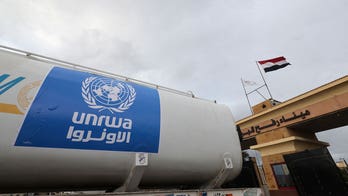The Obama administration is pressuring Congress to ease the potential impact of crippling sanctions on Iran's Central Bank, arguing that the restrictions will drive up oil prices and wind up being a boon for Tehran and its pursuit of a nuclear weapon.
In a plea to House and Senate negotiators crafting a broad defense bill, the administration has asked for substantive changes to a provision that would target foreign financial institutions that do business with the Central Bank of Iran, including a six-month delay for all the penalties. But the chief sponsors of the sanctions, which the Senate resoundingly backed last week on a 100-0 vote, are resisting the request.
In a letter late Monday to House and Senate negotiators, Sens. Mark Kirk, R-Ill., and Bob Menendez, D-N.J., pleaded with them to leave the sanctions intact.
The penalties are "tough, responsible and, most importantly, bipartisan," the two lawmakers wrote. "It provides the administration another key tool to curb Iran's pursuit of nuclear weapons, while keeping oil markets stable and encouraging other nations to reduce Iranian oil purchases. With the support of every single United States senator, it needs no alternations."
Lawmakers said they hope to complete work on the massive, $662 billion defense bill by the end of the week.
Tougher sanctions against Iran have widespread support in Congress, reflecting concerns not only for U.S. national security but ally Israel's as well. Two weeks ago, the Obama administration announced a new set of penalties against Iran, including identifying for the fire in its current form because it would undermine its effort to bring international pressure on Iran. He also warned that instead of penalizing Tehran, the sanctions could have the opposite effect by boosting oil prices and benefiting Iran financially.
"Iran's greatest economic resource is its oil exports," Geithner wrote. "Sales of crude oil line the regime's pockets, sustain its human rights abuses and feed its nuclear ambitions like no other sector of the Iranian economy."
Kirk said he has had discussions with oil suppliers who say production is set to double with the wars ending in Iraq and Libya. Kirk also said last week that Saudi Arabia's ambassador assured him they were willing to increase production.
The Republican senator said the administration's opposition was a "miscalculation on the part of the president's re-election campaign" that the congressional effort would result in higher gas prices for voters next year.




